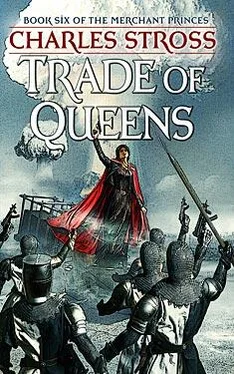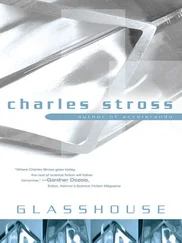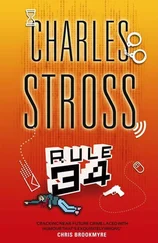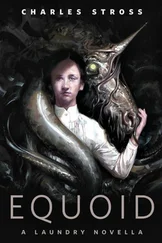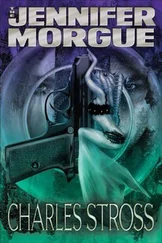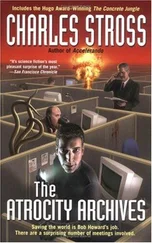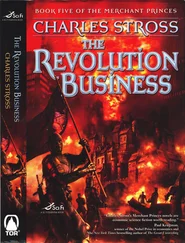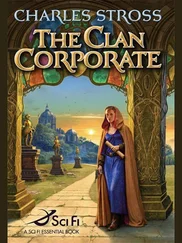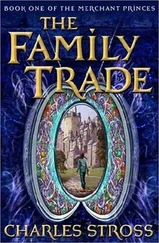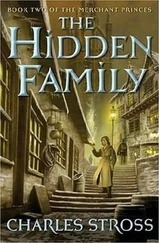Charles Stross - MP 6 -The Trade of Queens
Здесь есть возможность читать онлайн «Charles Stross - MP 6 -The Trade of Queens» весь текст электронной книги совершенно бесплатно (целиком полную версию без сокращений). В некоторых случаях можно слушать аудио, скачать через торрент в формате fb2 и присутствует краткое содержание. Жанр: Старинная литература, на английском языке. Описание произведения, (предисловие) а так же отзывы посетителей доступны на портале библиотеки ЛибКат.
- Название:MP 6 -The Trade of Queens
- Автор:
- Жанр:
- Год:неизвестен
- ISBN:нет данных
- Рейтинг книги:4 / 5. Голосов: 1
-
Избранное:Добавить в избранное
- Отзывы:
-
Ваша оценка:
- 80
- 1
- 2
- 3
- 4
- 5
MP 6 -The Trade of Queens: краткое содержание, описание и аннотация
Предлагаем к чтению аннотацию, описание, краткое содержание или предисловие (зависит от того, что написал сам автор книги «MP 6 -The Trade of Queens»). Если вы не нашли необходимую информацию о книге — напишите в комментариях, мы постараемся отыскать её.
MP 6 -The Trade of Queens — читать онлайн бесплатно полную книгу (весь текст) целиком
Ниже представлен текст книги, разбитый по страницам. Система сохранения места последней прочитанной страницы, позволяет с удобством читать онлайн бесплатно книгу «MP 6 -The Trade of Queens», без необходимости каждый раз заново искать на чём Вы остановились. Поставьте закладку, и сможете в любой момент перейти на страницу, на которой закончили чтение.
Интервал:
Закладка:
It had taken Steve nearly an hour to get Fleming out of his office, during which time he'd gotten increasingly irritated with the skinny, intense agent's insistence that some insane conspiracy of interdimensional nuclear narcoterrorists was about to blow up the Capitol.
Why do the fruitcakes always pick on
me? he kept wondering.
Of course the explosion in Braintree checked out—gas mains, according to the wire feed. But that was no surprise: It was the sort of detail a paranoid would glom onto and integrate into their confabulation, especially if it happened close to their front door. One of the first warning signs of any delusional system was the conviction that the victim was at the center of events. Tom Brokaw wasn't reading the news, he was sending you a personal message, encrypted in the twitches of his left eyebrow.
Sure Fleming didn't seem particularly unhinged—other than insofar as his story was completely bugfuck insane and required the listener to suspend their belief in the laws of physics and replace it with the belief that the government was waging a secret war against
drug dealers from another dimension—but
that meant nothing. Steve had been a beat journalist for years before he found his niche on the tech desk. Journalists attract lunatics like dog turds attract flies, and he'd listened to enough vision statements by dot-corn CEOs to recognize the signs of a sharp mind that had begun to veer down a reality tunnel lined with flashing lights and industrial espionage. So he'd finally cut Fleming off, halfway down a long, convoluted monologue that seemed to be an attempt to explain how Beckstein had got his attention—not without qualms, because Fleming sounded halfway to stalkerdom when he got onto the subject of rescuing her from some kind of arranged marriage—and raised his hand. "Look," he said wearily, "this is a bit much. You said they made you translate tapes. And there are these lockets they use for, what did you call it, world-walking. Do you have any kind of, you know, physical evidence? Because you can appreciate this is kind of a complex story and we can't run it without fact-checking, and—"
Fleming stood up. "Okay." He looked exasperated. "I got it."
Steve peered up at him owlishly. "I don't want to blow you off. But you've got to see—they'll laugh me out of the meeting if I can't back this up with something physical. And this isn't my department. I'm not the desk editor you're looking for—"
Fleming nodded again, surprising him. "Okay. Look," he glanced at his watch, "I'll phone you again after they make their move. I don't think we'll have long to wait. Remember what I said?"
Steve nodded back at him, deadpan. "Atom bombs."
"You think I'm nuts. Well, I'm not. At least I don't
think
I am. But I can't afford to stick around right now. Let's just say, if a terrorist nuke goes off in one of our cities in the next week, I'll be in touch and we can talk again. Okay?"
"You got it." Steve clicked his recorder off. "Where are you going?"
"That would be telling." Fleming flashed him a feral grin, then ducked out of the cubicle. By the time Steve levered himself out of his chair and poked his head around the partition, he was gone.
"Who was that?" asked Lena from real estate, who was just passing with a coffee.
"J. Random Crank. Probably not worth worrying about—he seemed harmless."
"You've got to watch them," she said worriedly. "Sometimes they come back. Why didn't you call security?"
"I wish I knew." Steve rubbed his forehead. The shrill buzz of his phone dragged him back inside the cubicle. He picked up the receiver, checking the caller ID: It was Tony in editorial. "Steve speaking, can I—"
"Turn on your TV," Tony interrupted. Something in his tone made Steve's scalp crawl.
"What channel?" he demanded.
"Any of them." Tony hung up. All around the office, the phones were going mad.
No, it can't be,
Steve thought, dry-swallowing. He moused over to the TV tuner icon on his desktop and double-clicked to open it. And saw:
Two lopsided mushroom clouds roiling against the clear blue sky before a camera view flecked with static, both leaning towards the north in the grip of a light breeze—
"Vehicles are being turned back at police checkpoints. Meanwhile, National Guard units—"
A roiling storm of dust and gravel like the aftermath of the collapse of the Twin Towers—
"Vice president, at an undisclosed location, will address the nation—"
A brown-haired woman on CNN, her normal smile replaced by a rictus of shock, asking someone on the ground questions they couldn't answer—
People, walking, from their offices. Dirty and shocked, some of them carrying their shoes, briefcases, helping their neighbors—
"Reports that the White House was affected by the attack cannot be confirmed yet, but surviving eyewitnesses say—"
A flashback view from a surveillance camera somewhere looking out across the Potomac,
flash
and it's gone, blink and you've missed it—
"Residents warned to stay indoors, keep doors and windows closed, and to drink only bottled—"
Minutes later Steve stared into the toilet bowl, waiting for his stomach to finish twisting as he ejected the morning's coffee grounds and bile.
I had him in my office,
he thought.
Oh Jesus.
It wasn't the thought that he'd turned down the scoop of a lifetime that hurt like a knife in the guts:
What if I'd listened to him?
Probably it had been too late already. Probably nothing could have been done. But the possibility that he'd had the key to averting this situation sitting in his cubicle, trying to explain everything with that slightly flaky twitch—the man who knew too much—that was too much to bear. Assuming, of course, that Fleming was telling the truth when he said he wasn't the guy behind the bombs.
That
needed checking out, for sure.
When he finally had the dry heaves under control he straightened up and, still somewhat shaky, walked over to the washbasins to clean himself up. The face that stared at him, bleary-eyed above the taps, looked years older than the face he'd shaved in the bathroom mirror at home that morning.
What have we done?
he wondered. The details were in the dictaphone; he'd zoned out during parts of Fleming's spiel, particularly when it had been getting positively otherworldly. He remembered bits—something about mediaeval antipersonnel mines, crazy stuff about prisoners with bombs strapped to their necks—but the big picture evaded him, like a slippery mass of jelly that refused to be nailed down, like an untangled ball of string. Steve took a deep breath.
I've got to get Fleming to call in,
he realized. A faint journalistic reflex raised its head:
It's the story of a lifetime.
Or the citizen's arrest of a lifetime.
Is a nuclear unabomber even possible?
J. Barrett Armstrong's office on the tenth floor was larger than Steve Schroeder's beige cubicle on the eighth. It had a corner of the building to itself, with a view of Faneuil Hall off to one side and a mahogany conference table the size of a Marine Corps helicopter carrier tucked away near the inner wall of the suite. It was the very image of a modern news magnate's poop deck, shipshape and shining with the gleaming elbow grease of a dozen minimum-wage cleaners; the captain's quarters of a vessel in the great fleet commanded by an Australian news magnate of some note. In the grand scheme of the mainstream media J. Barrett Armstrong wasn't so high up the totem pole, but in the grand scheme of the folks who signed Steve's paychecks he was right at the top, Thunderbird-in-chief.
Читать дальшеИнтервал:
Закладка:
Похожие книги на «MP 6 -The Trade of Queens»
Представляем Вашему вниманию похожие книги на «MP 6 -The Trade of Queens» списком для выбора. Мы отобрали схожую по названию и смыслу литературу в надежде предоставить читателям больше вариантов отыскать новые, интересные, ещё непрочитанные произведения.
Обсуждение, отзывы о книге «MP 6 -The Trade of Queens» и просто собственные мнения читателей. Оставьте ваши комментарии, напишите, что Вы думаете о произведении, его смысле или главных героях. Укажите что конкретно понравилось, а что нет, и почему Вы так считаете.
